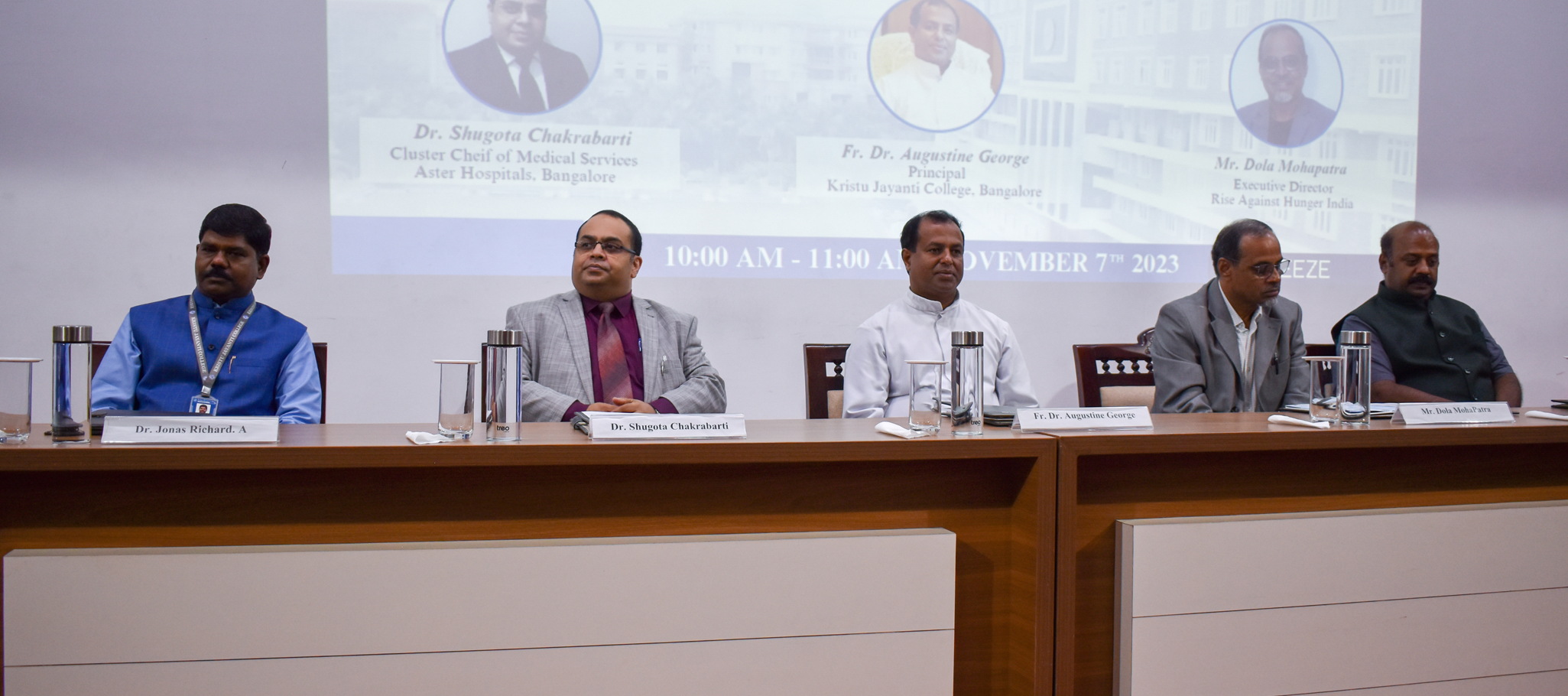
Seminar / Conference / Symposium
National Conference on Fostering Family Resilience: From Prevention To Empowerment
Date: 27 & 28 October 2025
The Department of Social Work, Kristu Jayanti University, Bengaluru, organized a two-day National Conference on “Fostering Family Resilience: From Prevention to Empowerment” to explore contemporary perspectives and practices that strengthen family systems in the face of social, psychological, and economic challenges on 27th and 28th October 2025. Total 140 participants were participated in the conference.
The inaugural session commenced with a warm welcome to the dignitaries, guests, and participants. The conference was inaugurated by Dr. Uma Buggi, Director, State Health and Family Welfare Department, Government of Karnataka, who emphasized the crucial role of family resilience in ensuring holistic well-being and mental health at both individual and community levels. The Presidential Address was delivered by the Vice-Chancellor of Kristu Jayanti University, who highlighted the importance of interprofessional collaboration and research in promoting strong, adaptive, and empowered families.
Day 1 Sessions: The first day featured insightful sessions by eminent experts Dr Uma Buggi, Director State Health and Family Welfare, Bengaluru, Dr. Sheila Ramaswamy from Azim Premji Foundation, Dr. K. Satyamurthi, Professor, Madras School of Social Work, and Ms. Saradha from NIMHANS, Bengaluru. Their deliberations focused on resilience for children psychosocial care within families, fostering family resilience in social work perspective and technology and family wellbeing.
Day 2 Sessions: The second day of the conference included sessions led by distinguished speakers — Shri Akshara Damle, Dr. Jayaprada Suresh, and Adv. Venkatasudrashan, a principal Judge, Session Court, Karnataka. The speakers addressed legal frameworks supporting family welfare, psychological empowerment, and community-based resilience strategies.
Paper Presentations sessions were organised in parallel sessions for the external presenters. Total 140 delegates attended the conference from both internal and external of the university. Scholars and practitioners from Tamil Nadu, Kerala, and Karnataka presented research papers on diverse themes related to family resilience, empowerment, gender dynamics, and social support systems. The paper presentations provided a platform for knowledge exchange and interdisciplinary dialogue among academicians, researchers, and social work professionals.
The two-day event concluded with a valedictory session that recognized the valuable contributions of all participants and resource persons. The conference successfully fostered meaningful discussions and collaborations aimed at promoting resilient and empowered families across India.
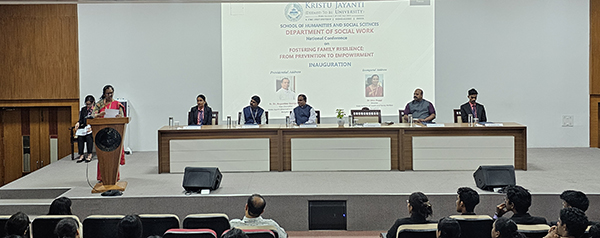
National Seminar on Building A Drug-Free Future: Innovative Prevention Strategies and Practices
Date: 30 August 2025
The Department of Social Work, Kristu Jayanti University, organised a National Seminar on “Building A Drug-Free Future: Innovative Prevention Strategies and Practices” to address the pressing issue of substance abuse and to highlight innovative measures for prevention and rehabilitation. The seminar witnessed the participation of faculty, research scholars, students, and practitioners from across the country.
The seminar commenced with an inaugural session graced by Dr. Parashuram K. G, Prof and Head, Department of Social Work, Tumkur University and Fr. Joshy Mathew, Director, School of Humanities and Social Sciences are officially inaugurated the event. In his address, Dr. Parashuram emphasized the urgent need for collaborative efforts in curbing drug abuse and underlined the importance of academic and community-based initiatives. He urged young professionals and social workers to become advocates of preventive strategies at the grassroots level.
Technical Session I – Psychiatric Strategies for Addiction: Prevention and recovery. Resource Person: Dr. Darshan Dr. Darshan highlighted the various innovative prevention strategies being implemented nationally and globally. He discussed the role of schools, families, and communities in early intervention and emphasized the significance of evidence-based practices. His session also drew attention to the need for awareness campaigns and policy-level changes to create a sustainable drug-free future.
Technical Session II – Family Dynamics and Substance Abuse Prevention. Resource Person
Dr. Sreedevi focused on the family dynamics and psychosocial dimensions of drug use and prevention. She elaborated on counselling approaches, peer support models, and therapeutic interventions that could be integrated into social work practice. Her interactive session encouraged participants to reflect on the mental health implications of substance abuse and the holistic support systems required for prevention.
Technical Session III – Psychosocial Support in Preventing Substance Abuse.
Resource Person Ms. Tamanna spoke on the importance of youth empowerment and community participation in addressing substance abuse. She shared practical field experiences, case studies, and community-level strategies, emphasizing that active youth engagement is critical to achieving long-term success in prevention. Her session inspired students to take up leadership roles in awareness and outreach programs.
The seminar concluded with a valedictory note summarizing the key insights from all sessions. The collective message reinforced the urgent need for multi-stakeholder collaboration, innovative practices, and active youth participation in building a drug-free future. The participants appreciated the resource persons for their valuable contributions and expressed commitment to translating the learnings into practice.
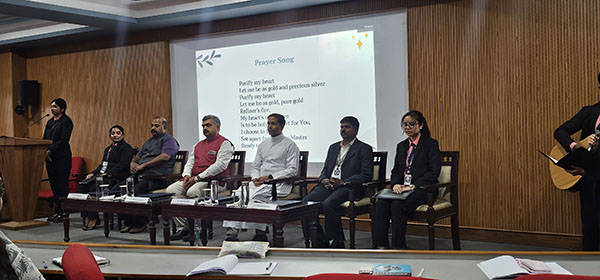
International Conference on Inclusion, Diversity, Equity & Accessibility (IDEA)
Date: 10 & 11 March 2025
The Department of Social Work, Kristu Jayanti College, Bengaluru in collaboration with the University Of Waikato, New Zealand, successfully organized two-day International Conference on Inclusion, Diversity, Equity, and Accessibility (IDEA) on 10th and 11th March 2025. The conference aimed to foster meaningful dialogues and explore innovative strategies to promote inclusion and accessibility in diverse social and institutional contexts.
The conference was inaugurated by Fr. Dr. Augustine George, Principal, Kristu Jayanti College, Mr. Sri Das Suryavamshi, State Commissioner, Person with Disability Act, Govt. of Karnataka, Dr Jonas Richard A, Head, Department of Social Work, along with student coordinators. Both dignitaries emphasized the importance of promoting inclusive societies and ensuring accessibility for all. Their addresses set the stage for insightful deliberations and knowledge-sharing sessions. The event brought together distinguished academicians, researchers, and social work practitioners from across the globe to deliberate on critical issues surrounding diversity and equity.
Eminent speakers from Nagaoka University of Technology, Japan, University of Waikato, New Zealand, University of Michigan-Flint, United States of America and renowned resource persons from Rajiv Gandhi National Institute of Youth Development, Chennai, Rittal India Private Ltd, Bangalore, Diversity Simplified Bangalore, Snehadhara Foundation Bangalore have contributed their valuable insights on various aspects of inclusive practices, policy frameworks, and strategies to enhance equity in education, workplace environments, and community spaces. Total 180 participants from various institutes have attended the conference.
A series of engaging paper presentations enriched the conference, with researchers presenting their findings on contemporary challenges and solutions related to inclusion, diversity, equity and accessibility. Topics covered included accessible education models, inclusive workplace practices, and empowering marginalized communities. All presenters emphasized the significance of creating equitable systems that embrace social and cultural diversity. Also highlighted the need for proactive measures to ensure marginalized voices are heard and included in policy-making frameworks. A cultural programme was also conducted by the Students of Social Work by focusing the importance of accessibility and inclusive development in the society.
The conference concluded with a valediction where all experts deliberated on actionable steps to promote diversity, equity, and accessibility in both local and global contexts. Participants praised the efforts of Department of Social Work, Kristu Jayanti College, Bengaluru and the University of Waikato for facilitating an event that underlined the importance of fostering inclusive societies. The department of Social Work thanked all the participants, delegates and resource persons for their significant initiative and collaboration for this noble cause.
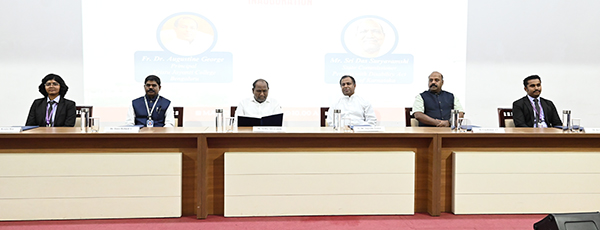
National Seminar on Technology in Social Work Practice
Date: 11 January 2025
The Department of Social Work, Kristu Jayanti College, Bengaluru organised a National Seminar on Technology in Social Work Practice on 11th of January 2025. The objective of the seminar is to provide insights to the use of technology in Social Work practice. To encourage the students to use the means of technology such as social media, use of internet and the Use of AI technology in providing services to the individuals, groups and communities. The seminar was designed to address the areas of social work professionals, research scholar, academicians and students.
The seminar was inaugurated by Fr. Dr. Augustine George, Principal, Kristu Jayanti College and Mr. Adarsh Natarajan, CEO& Founder, Aindra Systems, Bengaluru, Dr. Gopakumar A V, Dr Jonas Richard A and two students’ coordinators. Mr. Nataranjan has focused the use of technology in treating the patients in health care system. The use of technology in improving our community services should be the aim of our seminar is being addressed by Fr. Dr. Augustine, Principal Kristu Jayanti College. After the formal session of Inauguration, all the sessions have started with resource persons. The first session was on Technology and community Development by Mr. Chethan Elvis Das, Executive Director, Mahiti Infotech, Bengaluru. The resource person spoke on use of technology for community Development and upliftment of the community Members.
The Second session was on Responsible use of Social Media & Digital Platforms by Ms. Ashwini Tadpatriker, Clinical Psychologist, NIMHANS, Bengaluru. She talked on the effective use of social media, manifestation, risk, responsible use etc. She also highlighted the points on minimize over use and encourage social and group activities. The third session was a joint session lead by Dr Sushmitha Ananda Murthy, Senior Resident, NIMHANS, and Ms Sahithya, Psychiatric Social Worker, NIMHANS, Bengaluru. Both the resource persons focused light on the areas of tele counselling techniques and efficacy. The session was a detail description of the tele counselling in health sector. They also demonstrated a practical experience of tele counselling session with students. The last session of the seminar was on Role of Technology in Suicide Prevention by Mr. Muhammed Noorudheen, Scholar in Psychiatric Social Work, Suicide Prevention Centre Bengaluru. Mr.Muhammed has highlighted the important factors of Suicide among Youths and the process to prevent the rate of suicide by using technology. He showed a video on this issue and had an interactive session with all the participants of the Seminar. The Seminar was ended up with a vote of thanks and gratitude to wards all the participants to make this seminar a successful one.
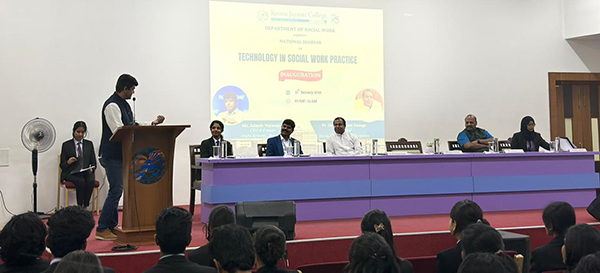
National Seminar on Child Safety and Protection Health and Hygiene
Date: 28 October 2024
The Department of Social Work, Kristu Jayanti College organised a National Seminar on Child Safety and Protection on 28th October 2024. The objective of the seminar was to provide an insight to the delegates and students on the need and protection of the children. A thought-provoking and essential gathering aimed at fostering a safe and nurturing environment for children. Esteemed speakers, policy-makers, educators, and child welfare advocates came together to address pressing issues surrounding child safety, abuse prevention, and effective protection mechanisms.
The seminar commenced with a Presidential Address by Fr. Dr. Augustine George, Principal, Kristu Jayanti College who emphasized the importance of collective responsibility in safeguarding children's rights and wellbeing. He highlighted the crucial role that educational institutions, families, and communities play in creating a secure and supportive atmosphere for children to thrive. The Inaugural Address was delivered by Dr. Shoba Devi, Chairperson, Child Welfare Committee, Bengaluru renowned expert in child welfare and protection. Dr. Devi provided an insightful analysis of the current landscape of child safety, underlining the urgent need for updated legislation and collaborative efforts between stakeholders. She shared data on recent trends in child abuse cases and advocated for increased awareness, sensitization, and training for educators and caregivers. Dr. Devi also outlined practical strategies for intervention and preventive care, empowering attendees to play an active role in child protection initiatives.
There were four sessions on Child safety and Protection. Session on Online safety of the child by Dr Rajesh Kumar, Asst. Professor, NIMHANS. The second session was on Child Safety and Protection in the context of Children in Conflict with Law by Fr. Dr Antony Sebastian. The third session was taken by Dr Ashwini N V on Essentuial Practices for Child Safety in schools and the last session on was on the State of Child Protection: Laws and policies by Ms. Sinimol P.J.
This seminar served as a crucial platform for dialogue, collaboration, and commitment towards the safety and protection of children, reinforcing the need for a unified approach to address these important issues.
On this occasion, the students of MSW were presented a Play themed on Child Safety and Protection.
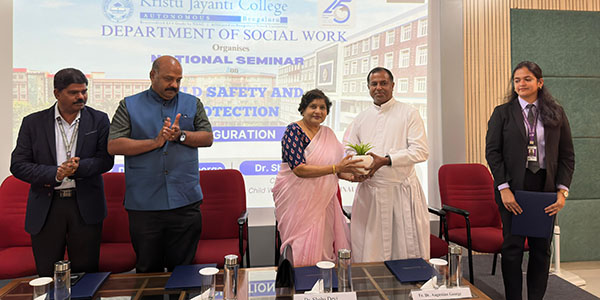
National Seminar on Workplace Wellness: Enhancing Productivity and Well-being in Modern Work Environment
Date: 14 October 2024
Department of Social Work, Kristu Jayanti College (Autonomous), Bengaluru organised a National Seminar on "Workplace Wellness: Enhancing Productivity and Well-being in Modern Work Environment" on 14th October 2024 at the H1 Auditorium, Humanities Block. The objective of the Seminar was to emphasize the importance of creating healthier, more supportive workplaces that can adapt to the evolving needs of employees in today’s fast-paced, high-stress environment. Experts from different fields, corporate leaders, HR professionals, and mental health advocates were participated in the Seminar. In inaugural session presidential address was given by Fr. Dr Augustine George, Principal Kristu Jayanti College followed by Inaugural address by Ms. Mai Tlau, Vice-President-Corporate Health Management, Prudent Insurance Brokers, Bangalore highlighted the direct connection between employee well-being and productivity. A thriving workplace environment promotes engagement, reduces stress, and boosts morale, all of which lead to higher productivity and retention rates. She emphasized that workplace wellness should encompass physical, mental, and emotional health.
Sessions at the seminar explored strategies like flexible work arrangements, on-site health programs, mental health support, and advanced ergonomic practices. Notably, Mr. Vijay Parthasarathy, IIMA, IITK former global CEO, shared his organization’s approach to hybrid work models, which have shown significant improvements in work-life balance and productivity. "We've seen first-hand how flexible arrangements can boost morale and engagement, leading to measurable business outcomes," he explained. Dr Jerrish A Jose had taken the session on Ergonomics, The third session was on Employee Engagement and the session took by Mr.Chellapandian Pitchai, Global Head of DEI and the last formal session was addressing the leadership and wellness by Mr. Thomas John Rose, Legendary Force Mission.
One of the highlights was a presentation on the impact of mental health resources on employee engagement, featuring recent research findings showing that workplaces prioritizing mental health experience a 20% increase in productivity. Attendees discussed the challenges of breaking the stigma surrounding mental health in the workplace and creating safe spaces for employees to seek help. The Seminar was conclude with a Cultural Spotlight by students of MSW focusing the role of Social Worker based on Rhythms for Revitalization.
The seminar received enthusiastic feedback from participants, with many expressing eagerness to implement the insights and strategies discussed. The National Seminar on Workplace Wellness underscored that in an era where burnout and stress are rampant, prioritizing workplace wellness is essential for enhancing productivity and overall employee satisfaction.
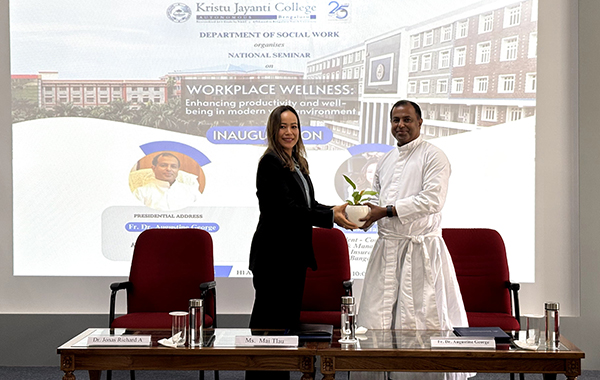
International Conference (Online) on‘Peace Building and Conflict Resolution: Empowering the Youth’
Date: 04 & 05 April 2024
The Department of Social Work, Kristu Jayanti College (Autonomous), Bengaluru in collaboration with North East Institute of Social Sciences and Research (NEISSR), Nagaland organised two days International Conference on Peace Building and Conflict Resolution: Empowering Youth on 4th and 5th April 2024. The objective of the Conference to facilitate collaborative efforts among diverse stakeholders to address the root causes of conflicts, promote understanding, and develop effective strategies for sustainable peace. It includes enhancing dialogue, sharing best practices, and promoting the exchange of ideas and experiences. Through workshops, panels, and networking opportunities, the conference aims to build partnerships, empower communities, and strengthen institutions dedicated to conflict prevention and resolution. Ultimately, it endeavors to contribute to a more peaceful and harmonious world by promoting reconciliation, justice, and respect for human rights on both local and global scales.
The conference was Inaugurated with an invocation prayer and followed prelude to Conference by Dr Jonas Richard A, Head Department of Social Work. The Presidential address by Fr Lijo P Thomas, Vice Principal and Chief Financial Officer, Kristu Jayanti College, Bangalore, The inaugural address by Dr. V Krishnappa, Director, Mahatma Gandhi Centre for Contemporary Ethics, R V University, Bangalore
The speaker of the session-I was Dr. Suba Chandran, Professor and Dean, School of Conflict and Security Studies, National Institute of Advanced Studies (NIAS), Bangalore. The topic of the session was, ‘State of Peace and conflict in 2024’. The session-II was conducted by Prof. John Langmore, Chair of Board, Initiative for Peace Building, University of Melbourne, Australia for the topic, ‘Peace education initiatives within academic institutions. Third session was being conducted by Fr. Dr. C.P Anto on Importance of Peace Education in modern times. The fourth session was on Stop Killer Robots: AI and Effects on Humanity’ by Dr. Balakrishna Kurvey. The resource person for the fifth session was by Dr. S. Kumaravel and his topic Role of Youth in Peace Building and Conflict Resolution. All the sessions were interactive one. All have focused their concern and knowledge and methods to minimise the conflicts of the current situation.
The paper presentation sessions were being moderated by Dr. Jonas Richard A, Head, Dept. of Social Work and Dr Baba Gnanakumar, Prof. & Director, Centre for Consultancy and Corporate Training, Kristu Jayanti College. Total 19 papers were presented by 33 nos. of Delegates/ Participants/ Students.
Overall, the International Conference on Peacebuilding and Conflict Resolution served as a platform for constructive dialogue, knowledge sharing, and collaboration, paving the way for coordinated action to address the root causes of conflict and build a more peaceful and prosperous world.
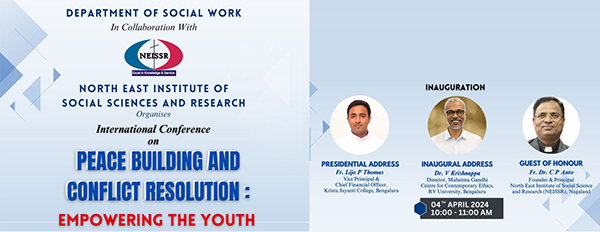
National Seminar on “Building Inclusive Communities: Integration and empowerment of Migrants and Refugees”
Date: 23 February 2024
Department of Social Work organized a One-day National Seminar on “Building Inclusive Communities: Integration and Empowerment of Migrants and Refugees” on 23rd February 2024. The seminar was well organized and executed with the joint efforts of faculty members and II-year Students of MSW. As part of Social Development Community Development Specialization, the National Seminar was focused on building inclusive communities and integration and empowerment of migrants and refugees of Bangalore. The objective of the National Seminar were to Enhance understanding of the experiences, needs, and challenges faced by migrants and refugees. To explore effective strategies for the integration of migrants and refugees into local communities, encompassing social, economic, and cultural dimensions. To discuss methods to empower migrants and refugees to access opportunities for education, employment, healthcare, and social services. Advocate for policies and practices that promote inclusivity, social cohesion, and mutual respect among diverse communities.To provide students the in-depth knowledge and insight of inclusive communities with respect to future application of Social Work Intervention.
Fr. Dr. Augustine George, Principal, Kristu Jayanti College along with Ms. Prameela V, CEO, Sampark, Bengaluru, Dr. Jonas Richard A, Head, Department of Social Work were inaugurated the seminar. The presidential address had given by Fr. Dr. Augustine George followed by the inaugural address by Ms Prameela V, CEO, Sampark, Bengaluru.
The formal sessions were started with the topics on Intervention strategies for enhancing wellbeing of the migrant population and Mandatory PDO for effective Integration migrants at Destination: Reflections from Personal Experience by Mr Harish, Project Coordinator, Sampark, Bengaluru and Dr. T LS Bhaskar, Assistant Professor, School of Social Sciences, MS Ramaiah University of Applied Sciences, Bengaluru. The third session was on Health and wellbeing of Migrant labourers was delivered by Dr. Caroline Elizabeth George, Consultant and Head of Department Community Medicine, Bangalore Baptist Hospital, Bangalore. The next session was on Legal and Policy Intervention Strategies for Migrant Population and the resource person Ms. Sinimol P J, Advocate and Legal Consultant, SRT Law Associates, Bengaluru has focused on the legal rights and preventive and progressive measures related to migrants and refugees. The session on the youth migration in India was being taken by Dr. Marchang Reimeingam, Asst. Professor, Centre for Study of Social Change & Development (CSSCD) and Institute for Social & Economic Changes (ISEC), Bengaluru. The last session was on working experience sharing on migrant workers and their problems in Bangalore. All the sessions were filled with information and knowledge based on working experiences and the seminar was a successful one.
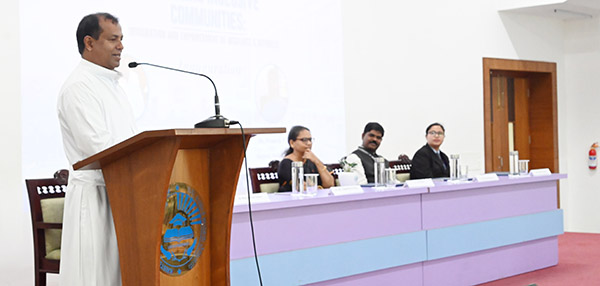
National Conference on Health & Well Being: Bridging the Gap for Sustainable Future in Collaboration with Rise Against Hunger India, Bengaluru
Date: 07 & 08 November 2023
The National Conference on “Health and Well Being- Bridging the gap for Sustainable Future” was inaugurated by Fr Dr. Augustine George, Principal, Kristu Jayanti College, Dr.Shugota Chakrabarti, and Cluster Chief of Medical Services, Aster Hospitals, Bangalore and Mr. Dola Mohapatra, Executive Director, Rise against Hunger India, Bangalore. The programme was started with a silent prayer and welcome addressed by Dr. Jonas Richard A. He also focused the departmental achievements since its inception. The presidential address was given by Fr Dr Augustine George, where he gave a valuable message to all the delegates and Participants on importance of health and well-being. Dr Sugota Chakrobarty has given the Inaugural Address and followed guest speaker by Mr Dola Mohapatra.
Soon after the Inaugural session, the key note session I was given by Dr Merlyn Joseph, Senior Residence, Dept. of Community Medicine, St Johns Medical College, and Bengaluru. She took the session on Comprehensive views on Health and Well Being, where she discussed the overall concept of health and well-being and its effect on our society. She also tried to give some figures on the significance of health for our sustainable future. The session was a fruitful one and it was ended with a question answer round. The vote of thanks was given by the student coordinator with a token of momentum with regards to her contribution to the conference.
The second session of the first day of the national conference was taken by Dr Anupama Deshmukh, Head, Dept. of Community Medicine, Bhaga wan Buddha Homeopathic College, Bengaluru. The topic on “Community Medicine” and its effective use in maintaining our health and well being was discussed with adequate examples. The resource person was also elaborated the discussion with lot of information on health and well being and the importance of community medicine in addressing the health issues of the community people. This session was an effective one. It came to end with a question answer round and ended up with a vote of thanks giving by student coordinator.
The third session of first day of national conference was taken by Dr Preetish Kiran, Associate Professor, Department of Medical and Education, St John Medical College, Bengaluru. Dr Preetish talked on “wellness of the Aged: An Indian Perspective.” He highlighted the points related to aged care and palliative care among old age populations. Dr Preetish narrated the issues of old age people in context to the Indian society. Their old age practices of health care and food habits of individuals. He also suggested important health acre practices for the aged populations to promote health care and addressing their mental health as well. The session was very effective and well executed. The session was ended with a question answer round with a warm vote of thanks by the student coordinator.
Next session of the conference was taken by Dr Vishwanath, Senior BL, Senior Consultant Physician and Diabetologist, Satva Specialist Clinic, Bengaluru. Dr Vishwanath is a speciality in diabetology. He discussed the current life style diseases and its impact on sustainable life of the people. His topic for the conference was on “Life style Diseases: Its prevention and Treatment. He focused the points which lead to life style diseases including the mental health. He raised the points of discussion on regular food habits. Sleeping habits and working habits of the common man. Not only he narrates the points but also, he throws some lights on prevention and treatment of life style diseases such as Diabetes, Hyper tension and obesity etc. He suggested some remedies for prevention and quick recovery from the lifestyle diseases by adding regular exercise, good food habits, nutrition, and protein content in food consumption, drinking maximum water and required amount of sleepings are important to maintain the healthy and happy life style.
The last session of day one national conference conducted a practical and action-oriented session for the delegates as well as for the students. Action based activities were performed by all participants. The games followed by the questions on health issues made the session more energetic and interactive one. After a tea break, the candidates gave feedback on the first day of conference and the meeting was over.
The second day of the national conference, four sessions were conducted on Mental Health services, Women’s Health in India: Issues and Concerns, Health and Well ness a Developmental Perspective and Health and Well- Being a Life skill Approach. Second day of the national conference was started with a Video prayer where all the delegates and Participants involved in. The first session was dealt by Dr. Rajani Deputy Director, Directorate of Health and Family Welfare Government of Karnataka and the topic of discussion was “Mental Health Services”. Dr Rajani spoke on mental health issues and challenges also suggested few tips to maintain mental health. The nest session was taken by Dr. T S Syamala, Professor, Population Research Institute for Social and economic Change (ISEC), Bangalore. Her topic for presentation was Women’s Health in India: Issues & Concern. She presented various issues of women health with adequate no of statistical data. She covered the topics on menstrual health, reproductive health, mental health, personal health and hygiene of women.
Third session of second day national conference took by Mahadev Hansanda, Head of Programmes, Rise Against Hunger India and his topic for discussion was “ Health and Wellness: A developmental Perspective. He narrated the condition of health and wellness in three states like Odisha, Chhattisgarh, and Jharkhand. Mr Mahadev also showed a video document on the functions of Rise against Hunger India. The topic “Health and Wellbeing a Life Skill Approach” was presented and discussed by Dr Kumaravel L, Head Department of Social Work, Rajiv Gandhi National Institute of Youth Development, Chennai. He elaborated experienced examples of Health and Life style diseases. The role of Social work in addressing the needs and challenges in health.
The paper presenter were presented their papers on respective three venues like Conclave hall, Admin Block, A1 Conference, Admin Block, and A3 Audi, 5th floor, Admin block. All papers were scrutinized by mediators.
National Conference was well organised and well executed by Social Work Faculties Dr.Jonas Richard A, Dr Winnie Joyce A, Dr Sathish Kumar R along with Students from II MSW and I MSW.
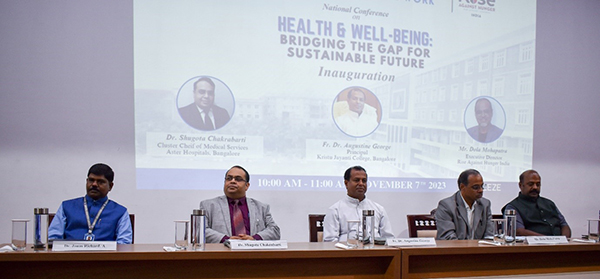
National Seminar on Integrative Approach to Counselling and Psychotherapy
Date: 20 October 2023
The primary objective of this National Seminar is to foster collaboration and knowledge exchange among mental health professionals, researchers, and educators in the domain of counselling and psychotherapy. By sharing insights and best practices, the seminar aims to promote a holistic understanding of mental health and well-being, explore and showcase various integrated approaches in counselling and psychotherapy, enhance the skills and knowledge of mental health practitioners, encourage research and innovation in the field and also raise awareness about the importance of integrated mental health care.
The seminar started off by an Invocation song by the Department Choir. Followed by which Dr. Jonas Richard A, Head, Department of Social Work was invited to deliver the Welcome Address and also to give the Prelude to the seminar. After Lighting of the Lamp, the Presidential Address was delivered by Fr. Joshy Mathew, Director- Library and Information Centre, Director- HR Department of English. The Chief Guest for the session Rev. Dr. Stanley Alex OFM, Director, Fountain Institute of Psychology & psychotherapy & Research, Krishnagiri was introduced by Ms. Sani Kazhine (Social work Trainee) who also gave the Inaugural address. Later ‘Spot Light’, the monthly newsletter of the department of social work was released by Fr. Joshy Mathew, Director- Library and Information Centre, Director- HR, Head, Department of English. The Inaugural Session came to an end by delivering the vote of thanks by Ms. Esther Feofaaki (student coordinator).
Following the inauguration, Session 1 on Counselling and Psychotherapy: An Overview commenced by introducing the key note speaker Rev. Dr. Stanley OFM, Director, Fountain Institute of Psychology & Psychotherapy & Research, Krishnagiri by Ms. Anna Sebastian (student coordinator). Sir started the session by giving an introduction to counselling and psychotherapy. He highlighted that counselling and psychotherapy are not the same but there is a difference between both and also talked about the various situations in which these can be applied. He also discussed about the various mental illnesses that can be treated under both. Later in the session sir also focused on the types, various techniques and the skills required in both counselling and psychotherapy. He ended the session by explaining the challenges faced by the counsellors and psychotherapists during the process and also shared some important points that need to be paid attention during the process.
In the end, the session was open for Q & A session to clarify the doubts of the participants.
The session was concluded by Ms. Anna Sebastian (student coordinator) with vote of thanks.
After a short break, session 2 commenced by inviting the key note speaker Dr. Srikanth Goggi, founder- GVA Institute of Psychology, Clinical Hypnotherapist & Behavioural Trainer, Bangalore by Mr. Muhammed Hafis N H (student coordinator) to address the gathering about the topic Wellness through Hypnotherapy. The session aimed in providing both theoretical and practical knowledge. It started by theoretical session where sir gave an overview about hypnotherapy, its history, implications in various settings and cases and its side effects. Second half of the session was a practical session where the delegates were part of the demonstration of hypnotherapy. Some of the highlights during the demonstration were sensory hypnotherapy where one of the student hands was hypnotised to be numb where she did not feel the pain even after a needle was inserted. Another student’s taste buds were changed and he felt that he was drinking a bitter juice even though he was just having water. Finally, a student forgot his name after he was hypnotised.
After the demonstration session the floor was opened for Q & A session where the quires of the delegates were answered to provide new insights.
The session ended by delivering the vote of thanks by Mr. Muhammed Hafis N H (student coordinator).
After the Lunch Break, Dr. Anandhi, Psychologist and Assistance Professor, Montfort College, Bangalore was invited by Ms. S Vaishali (student coordinator) to conduct a demonstration session on counselling skills and therapeutic techniques. A counselling room set up was made on the stage where ma’am highlighted the points that a counsellor should follow when having their counselling room. Later she demonstrated a counselling session with a student and at the same time she also discussed various skills that a counsellor should possess. She talked about observation skills, paraphrasing, empathy, communication skills, etc. and in addition she also focused on decoding the client’s behaviour or attitude through their body posture, gestures, voice tone, emotions, eye contact etc.
A Q & A session was held to facilitate any discussion among the delegates and the key note speaker.
The session ended by Ms. S Vaishali (student coordinator) with a vote of thanks.
The seminar progressed to session 4 on The Art of Career Counselling: Key competencies. The key note speaker Ms. Harmeet Bajaj, Academic Counsellor & Career Coach, Bangalore was invited by Ms. Larisha Wahlang (student coordinator) to address the gathering. The session was discussed in the perspective of the career counsellors and focused on the methods and techniques that can be used by the career counsellor during the counselling session. Ma’am gave an introduction to career counselling and proceeded by discussing about the reasons for which the clients may approach the counsellors. She then discussed the various methods for career analysis focusing on analysis based on competency which includes competencies such as positive criticism, helping attitude, networking, rapport building, appreciation, negotiation skills, interpersonal skills etc. She ended the session by explaining the ways in which the competencies can be matched to the appropriate career or academics so that the client may do well in the same.
The session then moved on to Q & A round to address the queries of the delegates.
The seminar came to a formal end by vote of thanks by Ms. Larisha Wahlang (student coordinator).
The National Seminar was well coordinated with the efforts of the faculties Dr. Winnie Joyce, Dr Sathish Kumar R and Dr. Bijaya Laxmi Sahoo under the guidance of department head Dr. Jonas Richard A.
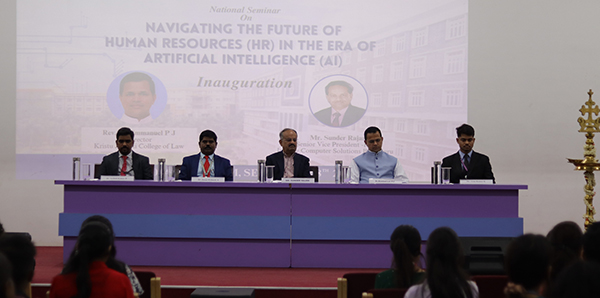
National Seminar on Navigating the Future of Human Resources (HR) in the Era of Artificial Intelligence (AI)
Date: 08 September 2023
Resource Person:
Department of Social Work organized a One-day National Seminar on “Navigating the Future of Human Resources (HR) in the Era of Artificial Intelligence (AI) on 8th of September2023. The seminar was well organized and executed with the joint efforts of faculty members and II-year Students of MSW. As part of the Human Resource Specialization, the National Seminar was focused on the role of Artificial Intelligence in Human resources. The objective of the National Seminar was to provide students the in-depth knowledge and insight of the Artificial intelligence in the fields of Human Resources in respect to the future and its application in various fields of Human resources.
Fr. Emmanuel P.J, Director, Kristu Jayanti College of Law, Director Office of International and Domestic Relations, Jayantian Alumni Association & Faculty, Department of Psychology inaugurated the Seminar and shared the Presidential Address. Inaugural Address was given by Mr. Sunder Ranjan, Senior Vice President – HR, Infinite Computer Solutions, Bengaluru.
The Departmental Newsletter was released during the inaugural session of the seminar by Fr. Emmanuel P.J, Mr. Sunder Ranjan and Dr Jonas Richard. The departmental newsletter was reflecting the progress of the department.
The formal sessions were started with the session by Ms. Divya Anand, Vice President- People Excellence Amagi Media Labs Pvt.Ltd. Bengaluru. She presented and share an overview information on Artificial Intelligence (AI) and Human Resources (HR). After that the second session was conducted by Prof. A.R Vijaya Chandran, Professor in HR and OB Bangalore on the topic Automation and HR. The Third session was taken by Dr. Jonas Richard A, Head of Social Work the Department, on Role of AI in HR: Case study Analysis. This session was a practical session, all the participants were divided in various groups and given assignment to present the role of Artificial Intelligence in Human Resources. All groups were prepared and presented their ideas and views on the topic and got evaluated by the Dr. Jonas Richard. Also got felicitated and Motivated with some Prizes. The last session of the Seminar was conducted by Mr Nadeem Pasha, Talent Acquisition Head, Robosoft Technologies Bangalore. He shared his experiences with all participants in relation to role of AI in talent acquisition. All the sessions were interesting and interactive as well. The National Seminar was well conducted by all the representatives of MSW II-year students starting from planning of the Seminar to the Execution to introducing the resource persons to providing all necessary supports to the both participants and resource persons as well. Students’ committees were formulated for the smooth conducting of Seminars. The committees were Discipline committee, Registration committee, Food and Documentation Committee etc. With the guidance and supervision of all the faculties the seminar went well and got appreciated by the participants.
At the end of the seminar thanks giving was given by the student representative of MSW II year. All the resource persons were felicitated with a plant pot for their support and cooperation.
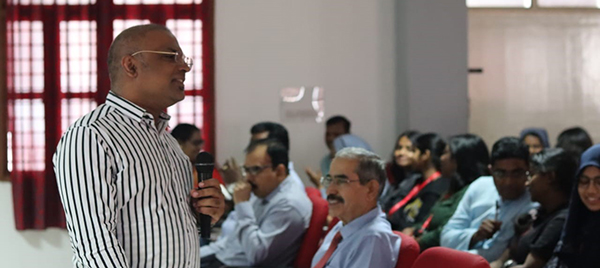
National Seminar on Mental Health Care in the Digital Age: Opportunities and Challenges
Date: 19 April 2023
Resource Person:
1. Dr T S Chandrasekhar, Understanding Mental Health care in digital age
2. Dr Sruthi Sivaraman, Mental health and aging
3.Dr Krishnan Bhatt, Mental health at work
4.Dr Alice Aloysius, Youth Mental Health: challenges and opportunities
5.Dr Arvind Raj, Community Mental health
In order to contribute to the growing concern of Mental health care in the present digital era, the Department of Social Work took up the initiative of organising a one-day national seminar on "Mental Health Care in the digital age: Opportunities and Challenges" on the 19th April 2023 from 10 am to 4:45 pm The seminar took off with an inaugural session that had Dr Jonas Richard A initiate by delivering the prelude, followed by Fr Lijo P Thomas proposing the presidential address. The chief guest was a prominent figure in Psychiatric Social Work Dr Dhanashankara Pandayan, who laid the ground foundation of the seminar. This was later followed by 5 plenary sessions on various domains where mental health care is of growing concern.
With mental health issues being on a steady rise for a while now it is of utter importance to have platforms like such in order to have experts share their knowledge and expertise in methods and means through which we as individuals could broaden our horizons and explore how digital technologies can be harnessed to improve mental health services and be aware of the ethical concerns that could potentially arise. But most importantly it was to help us reach out to those in need of mental health care. The seminar was a resounding success and ended on a note of gratitude.
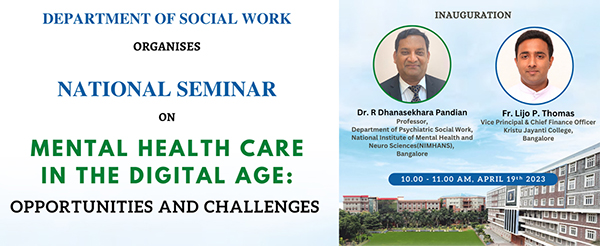
International Conference on Climate Curriculum
Date: 07 & 08 February 2023
About the Conference: Climate affects nearly every aspect of our lives, from our food sources to our transport infrastructure, from what clothes we wear, to where we go on holiday. It has a huge effect on our livelihoods, our health, and our future. Though we often think of human-induced climate change as futuristic changes, it is an ongoing process. Ecosystems and communities around the world are being impacted today because of changes in the climate.
Many countries recorded the highest temperatures since records began, more than 120 years ago. Europeans experienced their hottest summer in 500 years, accompanied by wildfires, droughts, and death. Major rivers reached record low levels. We are rapidly approaching dangerous tipping points for every aspect of human life, from our health and safety, our natural environment, and our economies, to our property and infrastructure.
Thus, educating future generations about the causes and effects of global climate change is imperative since implementing solutions depends on an informed public, for both societal and individual-level actions. To respond to the changing climate and prevent its adverse effects of it is very much vital as it is directly linked with Sustainable Development Goal (SDG):13 - "Climate Action" and also with other sustainable development goals such as "SDG:3 - Good Health and Well-being”, “SDG:12 – Responsible Consumption and Production”, “SDG:14 - Life below Water”, “SDG:15 - Life on Land” and SDG:1 – No Poverty.
With this background, the Department of Social Work organized International Conference on Climate Curriculum and called for a holistic approach to address the intensifying threat of global climate change by incorporating various stakeholders to educate the present and future generations with the below-mentioned objectives.
• To enhance the participants' understanding of the concept of Global Climate Change
• To sensitize the stakeholders on the impact of Global Climate Change
• To suggest recommendations for policy and research in reducing Global Warming.
• To motivate higher educational institutions to devise Climate Change Curricula for students.
• To promote the awareness and achievement of Sustainable Development and Sustainable Development Goals.
Day – 1 (7th February 2023)
Inauguration:
The International Conference kick-started with an Inauguration on 7th February 2023 at 9.30 AM in Kristu Jayanti College (Autonomous) Bengaluru with an invocation song by the social work department’s choir and lighting of the lamp by the guests. Ms. Rosanne Fernandes, the student coordinator welcomed the participants and guests for the International Conference. Dr. Jonas Richard A, Head – Department of Social Work, gave a prelude to the conference and highlighted the significance, and connection to Sustainable Development Goals and objectives of the conference to the participants. Fr. Joshy Mathew, Director – Library and Informatics Centre, Head – Department of English, Kristu Jayanti College, presided over the conference and delivered the presidential address. Fr. Mathew welcomed the Chief Guest Dr. Kalpana Gopalan IAS, Ph.D., IIMBAdditional Chief Secretary, Labour & Janaspandana-Public Grievances, Bangalore, Karnataka with a plant sapling. Dr. Kalpana Gopalan enlightened the participants in the Inaugural Address about the relevance of the theme "Climate Curriculum" in the current global context and the need for it through her motivating words from her three decades of experience as one of the senior bureaucrats of the country. Dr. Gopakumar A V, Dean of Humanities, Kristu Jayanti College, felicitated the chief guest with a memento and the session ended with a formal vote of thanks by Mr. Aquil C Sunny, the student coordinator.
Technical Session –I Climate Change: An Overview
The technical session – I was followed after the Inauguration. The student coordinator welcomed the guest speaker Ms. Ulka Kelkar, Director – Climate, WRI India Bangalore, Karnataka with a plant sapling. Ms. Kelkar threw insights on Climate Change with a detailed background of causes and its impact around the world. Madam explained the process of climate change and its influencing factors and linked the impacts to sustainable development goals (SDGs). The participants had an interactive session and the guest speaker answered the questions asked by the delegates. The session ended with a formal vote of thanks and felicitation guest speaker with a memento.
Technical Session – II Climate Change & Nation Building
Technical –II was chaired by Dr. Rohini Balasubramanian Sustainability & Climate Change Expert, RITES Ltd, Bangalore & New Delhi. The student coordinator welcomed the guest speaker with a sapling and handed over the session to her. Dr. Rohini described the nature of climate of change and how it is acting as a stumbling block in the nation-building process. Madam highlighted how climate change in India and around the world is affecting the economic and holistic growth of the nation and acting as a barrier to achieving SDG1 (No Poverty). Madam further pointed out the over usage of fossil fuels and limited awareness about the usage of electric vehicles for commutation in India to establish a connection of how it is a hindrance to growth. Dr. Rohini answered the questions asked by the delegates and the session ended with a formal vote of thanks and felicitation of the guest speaker with a memento.
Technical Session – III Climate Change & Wellbeing
The session started with an introduction of the guest speaker by the student coordinator and a welcoming of the guest with a plant sampling. Dr. Poornima Prabhakaran Director, Centre for Environment and Health, Public Health Foundation of India, New Delhi. Dr. Poornima elucidated the significant impact of climate change on public health in India and around the world. Madam explained how climate changes lead to outbursts of pandemic diseases through vectors and how that in turn affects the health and well-being of the public. Madam stressed that the changing climatic conditions around the world are going to be a great barrier to achieving SDG:3 – Good Health and well-being, especially in developing countries. Dr. Poornima had an interactive question and answer session with the delegates and the session ended with a formal vote of thanks followed by felicitation of the guest speaker.
Technical Session – IV Climate Challenge
The session on Climate Challenge was an online session chaired by the guest speaker Dr. Dinesh Elango, Vice President of Academic & Research, London Business University & LBU International, Singapore. The student coordinator introduced the guest speaker and handed over the session to him. Dr. Dinesh Elango addressed the delegates online from Singapore through interactive slides. Dr. Elango explicated the challenges that are put forth to the human race as a result of changing climatic conditions. The guest speaker clearly explained how these changes in climate around the world are negatively impacting the lives below water (SDG 14) and posing a major threat to the survival of the lives on land (SDG 15). Sir highlighted that it is high time for all of us to react and address these climate changes through the climatic curriculum in schools and colleges, thus making the sustainable development goal 13 – Climate Action an achievable one. Dr. Elango answered the questions asked by the delegates and the session ended with a formal vote of thanks.
Day – 2 (8th February 2023)
Technical Session – V Moving climate change to the front and center of Higher Education
The technical session on Moving Climate Change to the front and center of Higher Education started with an invocation song on the second day of the conference. Prof. Hong Yang Vice President and Charles J. Smiley Professor of Environmental Sciences, Bryant University & Radcliffe Institute for Advanced Study, Harvard University served as the guest speaker for the technical session. Prof. Yang elucidated the need for the incorporation of climate in higher education by throwing light on the positive and negative impacts of climate changes around the world. Professor further explained how the addition of climate change in the curriculum of higher education would result in spreading awareness to future leaders and help in combating the crisis at present and in the future. The participants were very active and got their questions addressed by the guest speaker. The session ended with a formal vote of thanks by the student coordinator.
Poster Presentation
Following technical session V, the participants had an active poster presentation session. The session was carried out by Dr. Jonas Richard A, Head- Department of Social Work, Kristu Jayanti College. Dr. Richard divided the participants into various groups and gave the guidelines for the poster presentation. Groups were divided in such a manner that there were participants from various organizations in each group. Participants were allowed to move around the campus and come up with a poster related to the theme of the conference. The session enhanced the participants to come up with their creative ideas and understand the thought process of their team members. After the allotted time for preparation, all participants gathered at the venue of the conference to present their posters. Dr. Richard guided the participants of every group to present their creative thoughts and ideas related to Climate Change and Climate Curriculum and helped them to motivate the participants with their work which was displayed on the board. The session ended with a concluding remark from Dr. Richard and a formal vote of thanks by the student coordinator.
Technical Session – VI - Climate Change & Economic Implications
The last technical session of the conference was chaired by Dr. Krishna Raj, Professor, Centre for Economic Studies and Public Policies (CESP), Institute of Social Science and Economic Change (ISEC), Nagar Bahavi, Bengaluru. Dr. Krishna Raj signified the impact of climate change on the economy of our country and the world. The guest speaker highlighted how a change in climatic conditions in India and around the world is harming the economy by affecting the production of commodities and distribution of supplies. Dr. Krishna further urged the participants that the prevailing situation requires immediate action against climate change to avoid economic devastation in the future and strive for further development. The session ended with questions from the participants being answered by the guest speaker and a formal vote of thanks with felicitation of the guest.
Paper Presentation
In the second half of the last day of the International Conference, delegates from various institutions presented their papers both offline and online. Dr. Challaraj Emmanuel, Programme Coordinator (PG), Department of Life Sciences, Kristu Jayanti College (Autonomous) served as the moderator for the session. There were eleven papers presented during the conference. Each participant was given 7 minutes (with 5 minutes alarm bell) to present the paper followed by discussion and comments from the moderator. All papers presented during the conference portrayed various impacts of climate change in India and around the world. The moderator in his final remarks stated that all presentations highlighted the need for the addition of climate change and its impacts in the curriculum of higher education to address and minimize the devastating effects of climate change. The session ended with a formal vote of thanks and felicitation of the moderator with a memento.
Concluding Remarks:
The Two-Days International Conference on Climate Change ended with concluding remarks from the Conference Chair – Dr. Jonas Richard A. Sir in his concluding remarks highlighted the impact of theme and subthemes through the technical sessions handled by resource persons from diverse disciplines. Dr. Richard appreciated the active participation of all delegates who attended the session both offline and online from various parts of the country. Sir elucidated the success of the conference by highlighting the enriching technical sessions with creative poster presentations and thoughtful paper presentations by the delegates. Prizes were given to the groups of poster presentations and the International Conference on Climate Curriculum ended with a formal vote of thanks and a group photo.
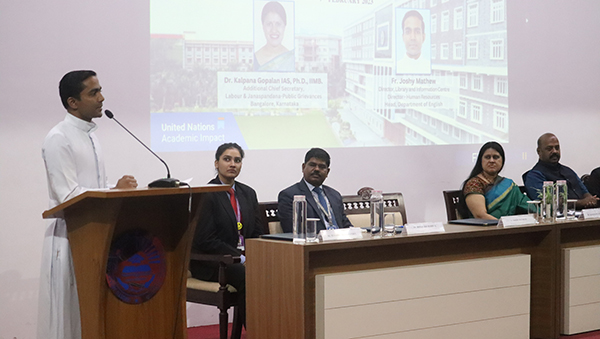
National Seminar on Womenomics
Date: 17th October 2022
The Department of Social Work in collaboration with the Department of Economics organized a National Level Seminar on Womenomics. The aim of the seminar is to enhance the understanding of the concept of WOMENOMICS which began in Japan and adopted by various countries. Chief Guest for the Inaugural Session was Ms. Rupa Rani, Founder President, Forum of Women Entrepreneurs and Director, Federation of Karnataka Chambers of Commerce and Industry.
The seminar started with an Invocation Song by the Department Choir. Dr. Jonas Richard A, Head of the Department of Social Work, Kristu Jayanti College (Autonomous) gave the welcome address and prelude to the seminar and emphasized its significance towards the development of our Nation.
Fr. Dr. Augustine George, Principal, Kristu Jayanti College (Autonomous), Bengaluru welcomed the guest by felicitation with a plant sapling and delivered the Presidential Address. His address to the participants exemplified the importance of women in the work force and its impact in the development of the nation. Fr. Principal epitomized the need for women in economic development through his vibrant and motivating words.
Ms. Rupa Rani, in her Inaugural Address, shared her life experience of becoming an entrepreneur in a male dominant field and society. With her inspiring words, Madam enlightened the participants with the concept of Womenomics and its impact in the lives of women, society and nation at large. Madam reiterated that women should continue to grow in the field of economics by becoming entrepreneurs leading our nation in the path of development with courage and pride. The inaugural session ended with vote of thanks by Dr. Vinodha Devi, Head, Department of Economics, Kristu Jayanti College (Autonomous), and felicitation of the Chief Guest with a memento.
The Seminar had Two Expert Sessions after the Inaugural session which were handled by two eminent women entrepreneurs Ms. Harini Reddy, CEO – Zamindar Restaurant, Bengaluru and Ms. Divya R Tadimeti, Founder – VOXCOACH respectively.
Ms. Harini Reddy motivated the students and future entrepreneurs with her powerful speech and grasped the attention of the participants with her success story of becoming an effective entrepreneur. Ms. Reddy highlighted how she came up with the concept of 299/- and made it a grand success immediately after the covid pandemic. She inspired the participants with the strategies that she adopted to overcome the loss during pandemic. Madam was felicitated with a memento as a token of gratitude.
Ms. Divya R Tadimeti gave an energizing and inspiring speech to the participants highlighting her shortfalls, struggles and the steps that she took to become an entrepreneur following her passion. She had practical session for the participants making everyone to warm up and sing along with her to showcase the ability of every single person and motivated them with the lyrics of the song that everyone sang. Madam insisted that women have great potentials that can be harnessed towards greater development of the nation at large. Madam was felicitated with a memento as a token of gratitude.
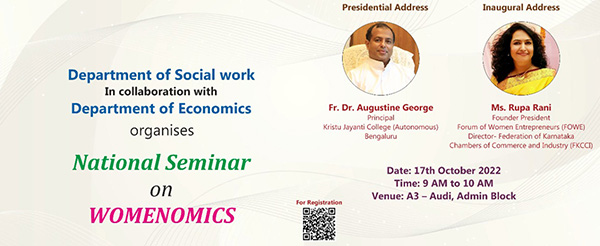
International Conference on Social Work Practice With Migrants and Refugees
The Two-day International Conference was organized by the Department of Social Work, at Kristu Jayanti College (Autonomous), on 24th and 25th February 2022 in a blended platform with more than 150 participants both online and offline.
Inauguration
The conference started with a prayer song from college choir, followed by the welcome address by Dr. Rubavel M, Assistant Professor, Department of Social Work. Dr. Jonas Richard A, Professor and Head, Department of Social Work gave the prelude to the conference. Dr. Richard emphasized the significance of the conference and its theme “Social Work Practice with Migrants and Refugees” by quoting the statistical data on migrants and refugees and various problems faced by them at both national and international levels.
Presidential Address
The Presidential Address of the international conference was delivered by Fr. Dr. Augustine George, Principal, Kristu Jayanti College (Autonomous). Fr. Dr. Augustine George addressed the gathering by extending his gratitude to the chief guest and giving a short introduction about Kristu Jayanti College and the Department of Social Work. Fr. Principal quoted the statistical data of forced migrants and the human rights violation experienced by them which requires the change in migration policies of various nations. He particularly highlighted the importance of social work practice and its vital role in addressing the issues of migrants and refugees to make the world a better place for all human beings.
Inaugural Address
Dr. W.G. Prasanna Kumar, Chairman, Mahatma Gandhi National Council for Rural Education (MGNCRE), Hyderabad, delivered the Inaugural Address of the conference. Dr. W. G. Prasanna Kumar with his humble nature gave a motivating address to the gathering with an introduction of association and disassociation and its relationship with migrants and refugees. Dr. Kumar enlightened the participants with the importance of culture and assimilation with reference to migration and conflict zone. Dr. Kumar quoted the example of parsis in India and the way they adopted to the culture of India and their contribution to development of the nation. Sir, emphasized the importance of migration process and practice of facilitated migration which directly addresses the key issues of migrants. Dr. Kumar accentuated the role of Social Worker in the process of facilitated migration and structured functions to improve the quality of life of the migrants.
The Inaugural session ended with vote of thanks from Dr. Poornima P S, Assistant Professor, Department of Social Work.
Day 1 of the conference had four technical sessions which are mentioned below.
Technical Session I – Perspective Building on the Issues and Challenges of Refugees (ONLINE) – by Ms. Ms. Ragini Trakroo Zutshi, Associate Protection Officer, United Nations High Commission for Refugees (UNHCR), New Delhi. The technical session was enriched with key information on refugees, refugee protection, Issues and Challenges faced by refugees and action taken by UNHCR towards addressing the issues and challenges of refugees.
Technical Session II – Understanding Migrants and Refugees: A Psychological Perspective (OFFLINE) – by Dr. Urmi Nanda Biswas, Professor, Department of Psychology, University of Baroda, Vadodara. Madam discussed about the types of plural societies, fear negative emotions and prejudices, acculturation psychology and its significance in understanding migrants and refugees.
Technical Session III - Understanding Migrants and Refugees from A Social Work Perspective (ONLINE) – by Dr. Archana Dassi, Professor and Head, Department of Social Work, Jamia Milia Islamia, New Delhi. Dr. Archana expounded the issues and challenges faced by the migrants and refugees from a social work perspective. Madam elucidated that social worker play a crucial role in identifying the needs, issues and challenges of migrants and refugees.
Technical Session IV – Health and Social Security of Migrant Workers (ONLINE) – by Ms. Megha Jacob, Faculty, Department of Economics, Jesus and Mary College, Delhi University. . Ms. Megha emphasized the need of Health and Social Security of migrant workers in India by quoting various research studies and statistics. The speaker insisted that it is mandatory to address the health and social security needs of migrant workers to have an inclusive environment.
Day 2 of the conference had two technical sessions, paper presentations and valedictory which are mentioned below.
Technical Session V – Legal Protection for Migrant Workers (OFFLINE) – by Ms. Ruth Thomas, Advocate, Co-founder, SRT Law Associates, Bengaluru. Ms. Ruth gave a detailed view on the legal framework in India for the protection and regulation of migrant workers while quoting various case study examples. The speaker also brought out the significant relation between the legal provisions in India for migrant workers with the International Labour Organisation.
Technical Session VI – Role of Social Workers in dealing with Migrants and Refugees (OFFLINE) – by handled by Dr. Jonas Richard A, Professor and Head, Department of Social Work, Kristu Jayanti College (Autonomous), Bengaluru. Dr. Jonas conducted interactive and thought-provoking activities for the participants to emancipate the role of social workers in dealing with migrants and refugees. The session came to an end with a highly moving emotional video on the refugees who were restricted from entering borders of few nations.
Paper Presentation
After the technical sessions, the participants were divided into offline and online modes for paper presentation. A total of 16 research papers were presented of which 7 were offline and 9 were online presentations. The offline paper presentation was moderated by Dr. Susan Sanny, Associate Professor, Department of English (PG), Kristu Jayanti College (Autonomous), Bengaluru and the online paper presentation was moderated by Dr. Juby Thomas, Assistant Professor, Department of Media Studies, Kristu Jayanti College (Autonomous), Bengaluru.
Valedictory
The Two-day International Conference on “Social Work Practice with Migrants and Refugees” ended formally on 25th February 2022 with the Valedictory session. Dr. Gopakumar A V, Professor and Dean, Faculty of Humanities Kristu Jayanti College (Autonomous) gave the valedictory address. Dr. Gopa Kumar in his address summed up the sessions of the conference while highlighting the need, significance and impact of each session. The dean also emphasized the importance of social worker and the practice of social work to improve the lives of migrants and refugees across the globe. Dr. Kumar congratulated the participants, paper presenters and the organizers in concluding remarks.
The report of the two-day international conference was shared with the participants both offline and online. There was also a feedback session where the participants expressed their views and learnings of the conference. The conference ended with the National Anthem
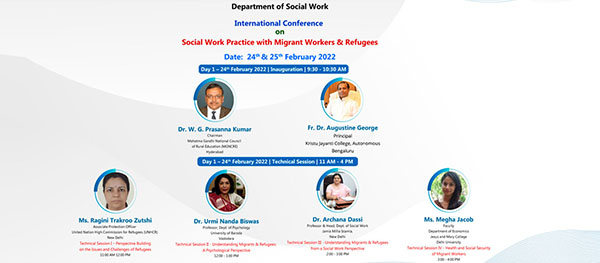
State Level Seminar on Ending the Violence against Women
Orange the World: End the Violence against Women Now
The state level seminar on Ending Violence against Women was organized by the Department of Social Work in collaboration with Save the Children, Non-Governmental Organisation, Bengaluru on 6th December 2021 at Kristu Jayanti College (Autonomous), Bengaluru with participants from across various districts of Karnataka.
The seminar started with the invocation by the department choir, followed by the welcome address by Dr. Jonas Richard A, Professor and Head, Department of Social Work. Dr. Richard welcomed the gathering by highlighting the theme “Orange the World: End Violence against Women Now and the statistical reports on violence against women at regional, national and international levels. Sir emphasized the need of this state level seminar by briefing the participants about the background of increase in various forms of violence that has occurred against women especially during the lockdown period of the pandemic situation in India. With this background Dr. Richard welcomed the participants to have a fruitful participative learning experience of the seminar.
The welcome address was followed by the Presidential Address by Fr. Dr. Augustine George, Principal, Kristu Jayanti College (Autonomous). Fr. Dr. Augustine George, addressed the gathering with a warm note of appreciation for organizing the seminar which was need of the hour. Fr. Augustine accentuated that the violence against women will end, only if women come to decision and policy making positions of the nation. Fr. Principal, highlighted the importance of higher education of women in India and its outcome in terms of women empowerment and development of the nation as a tool to root out violence against women. He further urged that women should take up civil and judicial services to hold higher executive positions in the nation to frame and execute policies and programmes to protect women rights enabling empowerment of women to curb down the social evil of violence against women in this 21st century. The Presidential Address has ignited the participants to pay greater attention for the following sessions.
Dr. Meru Miller, Founder & Secretary of RICE-MMS, Hosur delivered the Inaugural Address of the Seminar. Dr. Miller in his thought provoking address insisted that women should come to political power by holding administrative positions in the country to reduce and end violence against women in India. Dr. Miller shared his vast experience in the field of human rights, child rights and women rights at regional, national and international levels to enlighten the participants about the significance of women rights. Sir quoted significant examples from all over the world to show that women are very vulnerable to violence by their own family and close relatives. He enlisted various forms of violence against women in their families and society to make the participants aware of the present prevailing social evil in India. Dr. Miller stressed that women should be the head of houses to promote empowerment and development of women. Dr. Miller concluded his Inaugural address by insisting that young women should enter in politics to be great political leaders of tomorrow to promote and obtain overall empowerment of women to end the violence against women.
After the Inaugural Address, the participants were given 10 minutes break time for refreshment.
The seminar had two technical sessions of which the first technical session started was handled by the Ms. Sinimol PJ, Advocate and the second by Dr. Jonas Richard A and Dr. Winnie Joyce A. Prelude to the technical sessions was given by Mr. Ashish , Project Assistant, Save the Children, Benagluru. In the prelude, Mr. Ashish briefed the participants about the importance of the technical sessions on topics that addressed the ways and possible means to curtail and end the practice of violence against women in India. In the first technical session, Ms. Sinimol enlightened the participants with various legal provisions in India to protect the rights of women. The speaker emphasized that the several significant laws that restrict and prevent the violence against women should be made aware to every single woman in the country to spread the awareness and bring down the violence against women. She also quoted the international laws to protect women rights and their applicability in India. In the technical session, the speaker mentioned about various social personalities to highlight the significance of women rights under the constitution of India. Ms. Sinimol further stated women are the first blocking stone for women empowerment and urged that women should come forward and speak boldly about the violence happening in dark as a first step towards ending it. As a concluding note, she insisted that every woman should support other women towards attaining empowerment and men should protect the cause to end the violence against women.
The Second technical session was handled by Dr. Jonas Richard A and Dr. Winnie Joyce A. During the session, all participants were given an activity in which they were made to stand in a straight line and asked to respond to the questions by moving left or right or remain in the same position. In the activity the participants were posed with a series of gender based statements for which the participants were asked to move left if they don’t agree to the statement, right if they agree and remain in the same position if they are not sure about their view on the statement. All participants were actively involved in the activity and expressed their personal thoughts on the gender based statements. This active session has enabled the participants to understand the importance of sex and gender to end the violence against women in India. Dr. Richard and Dr. Joyce concluded the session by emphasizing the need of gender sensitization and practice of gender equality to end the violence against women by painting our minds in orange.
The guests of technical sessions were felicitated with shawl and memento.
The Seminar ended with concluding remarks from Dr. Jonas Richard A and vote of thanks by the student coordinator.
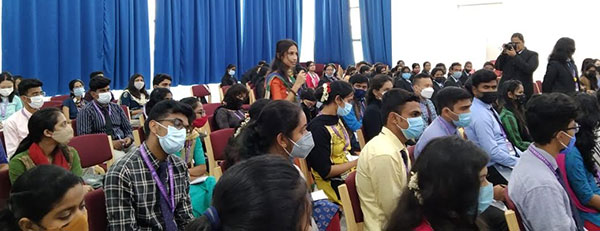
Virtual Symposium on Mapping the SDGs in the CSR Practice
The Department of Social Work, Kristu Jayanti College (Autonomous), Bengaluru organized a Virtual Symposium on “Mapping the SDGs in the CSR Practice” on 16th January 2021, that saw a gathering of more than hundred participants including representatives from various NGOs, CSR professionals and social work teachers and students from several institutions. The symposium had five key speakers who gave insight on the significance of 17 Sustainable Development Goals set by the United Nations, in the practice of Corporate Social Responsibility.
The programme began with the invocation by Ms Nimisha Mathew (1st MSW) after which the welcome speech and the introduction of the speakers was done by Ms Charis Browne (2nd MSW) .
The first speaker of the programme, Mr Abhishek Ranjan, Director & Global Head, Sustainability and D & I, Brillio Foundation India, Bangalore, emphasized about the interconnection of SDGs and the impact of the SDGs in the future in a positive manner. He also highlighted what must be done sustainably and strategically, which further allows the organization to be more profitable in every sense.
The next speaker was Mr Manish Kumar Srivastava, Compliance Manager – Risk Management, Association of Voluntary action, New Delhi. Mr Srivastava expounded on the practices whereby SDGs could be linked in the CSR reality. Ms Anupam Nidhi, Head, Corporate Citizenship (CSR), Hindustan Zinc Limited gave a detailed view on the 360° approach of CSR that could be done alongside for the implementation of SDGs.
The next speaker, Ms Babita Dhankhar, Independent Owner of Babita & Associates, New Delhi, addressed the National Guidelines for Responsible Business Conduct (NGRBC) and highlighted the significance of auditing and audit levels in CSR practice. The final speaker of the day was Dr Jonas Richard A., Head, Department of Social Work, Kristu Jayanti College, who accentuated about the responsibilities of Institutional Social Responsibility (ISR) in implementing SDGs and how KJC, as the Hub of SDG 1, has accomplished it including carrying out major researches in the related areas and guiding corporates in building, assessing and redesigning SDG models required in their areas of expertise.
The combined approach and efforts of the faculty members of the Department of Social Work, helped the participants to understand how to interlink the SDGs in the area of CSR. The participants felt that they had benefited immensely in having such insightful sessions, which would help them in their overall development personally as well as professionally. The expert sessions collectively had a positive impact on the trainees and led to the strengthening of their professional social work abilities.
National Seminar on Human Rights
A National Seminar on Human Rights and Sustainable Development Goals Agenda: Empowering the Marginalized and Ensuring Inclusiveness was organized by the Department of Social Work in collaboration with World Vision India and CARE on 16th December 2019.
The seminar commenced with an invocation by the department choir. Dr. Jonas Richard A, Head, Department of Social Work, welcomed the gathering. Dignitaries officially inaugurated the seminar by lighting the lamp.
Rev. Fr. Dr. Augustine George, Vice Principal, Kristu Jayanti College, in his inaugural address acknowledged the support of World Vision India and CARE. Fr Augustine also pointed out that it is the responsibility of the judiciary, government and the media to ensure the enforcement of human rights and appreciated the department’s initiative in organizing the seminar.
Ms. Aiswarya Vimal, Student Representative, introduced the chief guest, Justice CG Hungund, Former Chairperson, Karnataka State, Human Rights Commission. Justice CG Hungund, in his inaugural address elucidated how human rights and associated acts evolved over centuries and attained a global dimension. He pointed out that Human Rights are a widely spoken agenda in most of the recent conferences and conventions thus highlighting the significance of the topic. He briefed the Basic Civic Amenities and Law and Order classification of human rights violation cases. Justice also narrated human rights violation cases which he came across during his tenure. He highlighted that in this era of industrialization and modernization our society is lacking human culture.
A book on Indian Constitution was presented to the dignitaries. Dr. Rubavel M, Assistant Professor, Department of Social Work, delivered the vote of thanks. The formal session came to a closure with the college anthem
Technical session-I titled Promoting Human Rights and Sustainable Development Goals through Global Governance was handled by Ms. Sagaya Shanthy, Head-Women’s Unit, Indian Social Institute(ISI), Bangalore She stated the facts and figures of people who had been forcibly displaced as result of persecution, conflict, violence and human right violations. According to her, one of the reasons for the sustainable development goals and the 2030 Agenda are a transformative development framework based on human rights. She pointed out the differences between sustainable development goals and human rights. She concluded the session by stating that inclusiveness is a vital factor in achieving the sustainable development goals.
Technical session-II on Building Resilience of the Poor through Social Protection was taken over by Mr. R. Manohar, Executive Director, Centre for Amenities, Rehabilitation and Education (CARE). He stressed on the seven things to know about managing climate risk through social protection. The session pointed out the importance of focusing on social protection for climate risk. According to him, climate shocks and natural hazards represent a significant part of the global humanitarian burden and hinder poverty eradication.
Technical session-III on Pathways to create Child Friendly Cities was handled by Mr. Vetriselvan John, Senior Manager, World Vision India). He detailed about the Child Friendly Cities Initiative (CFCI) 1996, strategies to adopt CFC and principles to be followed while building child friendly cities. The session was open for discussion and participants clarified their doubts.
Technical session-IV on Ensuring Accountability on SDG’s on Women’s Rights by Ms Sinimol P G, Advocate and Legal Consultant SRT Law Associates) focused on the constitutional rights to women and the reason behind the prevalence of violent crimes against women.
The session was winded up with National Anthem. Participants were awarded with the participation certificates. The seminar was well co-ordinated with the efforts of the faculties Dr. Winnie Joyce A., Dr. Rubavel R., Dr. Birudu Raju and Miss. Anurupa under the guidance of department head Dr. Jonas Richard A.
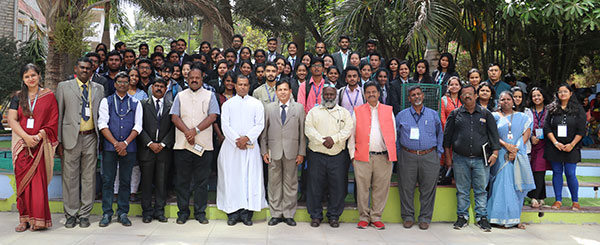
Symposium on Bonded Labourers
The Department of Social Work, Kristu Jayanti College in association with International Justice Mission (IJM) organized a two day national level symposium on release, recovery, & rehabilitation of bonded Labourers on the 12 & 13th December 2018.
While the human race is progressing with rapid technological advancement, still there is a significant percentage of the human population under the clutches of most inhuman way of slavery known as bonded Labourers. Bonded labor system refers to the forced labor under which a debtor enters into an agreement with the creditor that he would render service to him either by himself or through any member of his family or any person dependent on him, for a specified or unspecified period.
This symposium was organized in collaboration with International Justice Mission (IJM) with the aim of bringing together various experts and practitioners to exchange their ideas and approaches towards solving the issue of bonded labour with special reference to release, recovery, and rehabilitation of the victims. The participants were social development experts, senior academicians, legal professionals, field practitioners working to eradicate bonded Labourers and research scholars.
Ms. Siri Gowri DR, IPS, Superintendent of Police, State Crime Records Bureau was the Honorable Chief Guest. Ms Siri Gowri DR highlighted the importance of assessing and addressing the problems with regard to the post-rescue aspects. Rev Fr Josekutty PD, Principal, Kristu Jayanti College in his keynote address, explored the possible roles educational institutions can play in eliminating this social evil from the society. He suggested that there is a strong link between education and no poverty Mr. Indrajeet Pawar, Director of Operations, IJM, urged the participants to consider examining the issue of bonded labour beyond just rescue. He added that it was also equally important to identify the perpetuators and bring them to justice to prevent the instance of reoccurrence. Dr. Jonas Richard A., Head Department of Social Work categorically highlighted the need to re-examine the existing models of rehabilitation and to establish a new think tank and the need for academic institutions to be more proactive in educating the stakeholders on this dreadful social evil
Dr. A.J. Christopher, Professor of Social Work (Retd.), Sacred Heart College, Tamil Nadu, began addressing the gathering by clearly elucidating the problem of bonded labour. He recommended one follows the MSC model to approach any social problem. MSC refers to studying the Magnitude of the issue, Symptoms of the issue and Causes of the issue.
Mr. P.M. Philip, Executive Director – FVTRS moderated the discussions by experts. He opined that the first responsibility with regard to solving the issue of bonded labour lay with the government, and then comes the role of the society. He listed three major areas requiring attention with regard to bonded labour- 1. Prevention, 2. Identification and Recovery, 3. Rehabilitation and post recovery. Accordingly, the participants were divided into three groups, each group discussing one of the three areas. Thus day 1 came to an end with the group discussion
Day 2 of the symposium started with the prayer and the recap shared by Dr. Jonas, Richard A followed by the presentation by the representatives of the groups. The presentation session was moderated by Dr. A.J. Christopher and Mr. P.M. Philip Ms. Raveena, IJM, who represented group one, presented the summary of discussion related to prevention of bonded labour. She highlighted the importance of literacy and training of people which could help prevent people from being unemployed which in turn could help prevent them from becoming victims of bonded labourers.
Mr. Barnabas Pravin, Lead – After Care, IJM, who represented the group two, presented the ideas discussed as part of identification and recovery of bonded labourers. He stated that those who have escaped the bonded labour system need to help identify others and added that the reintegration of the bonded labourers could occur only when they had protection from the authorities. Dr. S. Rama Gokula Krishnan, Assistant Professor, Department of Social Work, Kristu Jayanti College represented group three and briefed the thoughts discussed by the third group on rehabilitation and post rehabilitation challenges. Among other things, he stated was that there was a need to reexamine both physical and mental health concerns in rescued victims.
The final session was handled by Mr. Barnabas Pravin and Ms Praisey Bai of IJM. Mr. Barnabas Praveen presented a short film titled ‘The Rice Mill’ which was about a peasant in South India who became a victim of bonded labour Ms. Praisey then explained a tool developed by IJM called the “Assessment of Survivor Outcomes” which is a tool used to understand the condition of the victims of bonded labour or any other human right atrocity. Ms. Praisey added that IJM was willing to pro-vide the scale free of charge upon request.
The symposium was concluded with the participants’ feedback and vote of thanks. The symposium was coordinated by Dr Winnie Joyce & Dr Emmanuel Daniel, Assistant Professors, Department of Social Work, Kristu Jayanti College and Ms Praisey Bai, Lead-After Care, International Justice Mission (IJM)

National conference on Disability Management at Work: Problems and Prospects
The Department of Social Work, Kristu Jayanti College organized a two day National conference titled “Disability Management at Work : Problems and Prospects” on the 11th and 12th of October, 2017 bringing around hundred participants which included various NGO representatives, research scholars, nursing students, special education teachers, social work teachers and students from several institutions. The conference was inclusive of six technical sessions, paper presentations and a panel discussion on “Disability Management at Work: A Multidimensional Perspective”
The first day began with an inaugural ceremony which commenced with a visual presentation incorporating the facts of the disability management and the world statistics of people with disability which helped the audience to get an idea about disability management. Dr. Jonas Richard A., Head, Department of Social Work and Convener of the National Conference, in his welcome speech highlighted how the concept of education has changed from ‘text and context’ to ‘test and contest’. Rev. Fr. Josekutty P.D, Principal, Kristu Jayanti College delivered the presidential address. The National Conference was inaugurated by Dr. Himangshu Das, Director, National Institute for Empowerment of persons with Multiple Disabilities (NIEPMD), Chennai, where the inherent attitude of society towards people with disability and their need for social security were highlighted. This was followed by a brief speech by Ms Aparajita Dhar, Programme Director, CBM India Trust, on the contributions made by the Trust towards helping the people with disability to lead a dignified life. The inauguration programme ended with a vote of thanks proposed by Dr. I Jerry Richards, Organizing Secretary and Faculty Member, Department of Social Work.
The first Technical session of the day began with Dr. Victor John Cordeiro, Development Professional and Researcher in Community based Rehabilitation (CBR) who explained the three theories of Disability and four important barriers which affects people with disability and the various ways to eradicate it. The second technical session was initiated by Dr. Pearl Malhotra, Professor, Department of Organisational Behaviour and Human Resource Management, IIM, Bangalore where madam spoke about the process, policy and programs implemented in India for the people with disability. Dr. Malhotra, further spoke about the facts of disability and the methods to reduce alienation of people with disability.
Mr. Santhosh Abraham, Vice President, Disability Initiative, NASSCOM foundation, Bangalore in the third Technical session, emphasized on the topic of employability of persons with disability in IT/ITES and the contribution of NASSCOM in this area. This was followed by a presentation on the research findings by CBM India Trust in collaboration with Public Health Foundation of India by Ms. Nagarathna.
The technical sessions were followed by a series of paper presentations by scholars from several institutes. Topics like disability management in employee engagement , CSR as a tool for disability management, Best practices in rehabilitation of disabled, Enhancing interpersonal relationship among adolescents with learning disability and The intervention tools to name a few, were presented subsequently.
The second day commenced with the fourth Technical Session where Dr. R Nalini, Head, Centre for women studies and Associate Professor of Social Work, Pondicherry University, Puducherry, on understanding gender disparities in disability management at work.
The fifth Technical session was taken over by Dr. Sandhya Limaye, Associate Professor, Centre for Disability Studies and Action, School of Social Work, Tata institute of Social Science, Mumbai where madam highlighted the academic discipline that examine meaning, nature of consequences of disability as a social construct and the concept and meaning of disability in the Indian context.
Dr. Janardhanan N. Navaneetham, Professor of Psychiatric Social Work, NIMHANS, Bangalore took over the sixth Technical Session, emphasizing the importance of Community Based Rehabilitation (CBR) by notifying the ability, maximisation and the access of opportunity within the community. Dr. Navaneetham also demonstrated the concept with pictorial representation of the various methods by which the people with disability can be brought into light.
The panel discussion commenced with a brief introduction on disability management by Dr. A. Thirumoorthy, Professor and Head, Department of Psychiatric Social Work, NIMHANS, Bangalore, who was also the Moderator of the Panel discussion.
Ms. Nimisha Jashnani, Principal Consultant - Disability Inclusion, Diversity and Equal Opportunity Centre, Bangalore, started off with the discussion on the diversity and CSR perspective in disability management. Ms. Jashnani also spoke about the different projects undertaken by NGOs working towards disability and stressed that companies should facilitate and support persons with disabilities irrespective of the position they hold in an organisation.
Subsequently, the discussion was undertaken by Mr. Nicholas Guia Rebelo, Executive Director, Collective Action for Basic Rights Foundation, Bangalore, where sir introduced Caritas Foundation, one of the common CBR forums which mainly works for the people with all kinds of disabilities and also provides different strategies initiated for the people with disabilities.
Ms. Jayna Kothari, Executive Director, Centre for Law and Policy Research, Bangalore spoke from the perspective of law and the rights for the people with disability by talking about the implementation of the various acts related to disability rights and the different lists of the disabilities which are seen in the society. Ms. Kothari then stressed on the requirements and necessities which should be made available to the people with disability and the equal opportunities and legal provisions.
Ms. Melanie Pereira, Human Resource Manager, CBM, India Trust began with a brief introduction on the CBM Trust and the objectives and contribution made by the Trust. Ms. Pereira also discussed on the measures taken towards inclusive employability like recruitment, accessibility, training and the wide-ranging HR policies and guidelines by identifying potential skills, talent and resources.
Mr. Manoharan Ranganathan, Regional Co-ordinator, South India for Human Rights Defenders Alert India, discussed with the perspective of Human Rights by underlining the principles of Human Rights and its applicability to all human beings. The two day National Conference came to a closure with a Valedictory Program. The program began with Dr. Jonas Richard A., Head, Department of Social work and Convener of the National Conference, welcoming the gathering. This was followed by a brief presentation of the report on the two day National Conference by Ms. Sneha Susan Raju, a student of second year MSW. Mr. Nicholas Guia Rebelo, Executive Director, Collective Action for Basic Rights Foundation, Bangalore, in his Valedictory address inspired the gathering by highlighting on how the society can help in making a better world for persons with disabilities to live in. Ms. Rajani Gopalkrishna, Senior Manager (Finance), Legal and Administration, CBM India Trust, felicitated the gathering by speaking on behalf of the persons with disability and quoted that ‘DIS–Ability is not a disability but in fact a super ability’. As a sign of dedication for the cause of the welfare of the disabled, an Oath was taken by the gathering administered by a student coordinator. Fr. Augustine George, Vice Principal, Kristu Jayanti College, in his concluding remarks commended the Department of Social work and further brought to light the importance of addressing the problems and prospects of managing disability at workplace. The Valedictory Program of the National Conference drew to a close with an oration of appreciation by Dr. I. Jerry Richards, Organizing Secretary and Faculty Member, Department of Social Work, Kristu Jayanti College.
The participants were greatly satisfied and enriched with the valuable information they received through the National Conference.
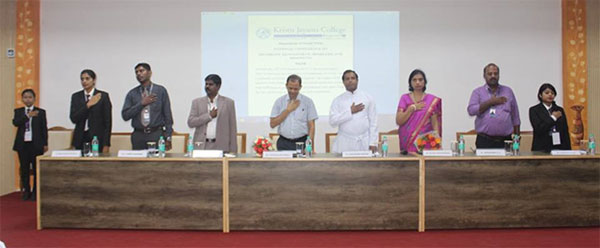
National Conference on Green Social Work
The Department of Social Work in collaboration with Children Movement for Climate Justice (CMCJ) organised a two-day National Conference on ‘Green Social Work – From Environmental Crisis to Ecojustice’ on 27th and 28th February, 2018 bringing around 100 participants including various NGO representatives, CSR professionals, research scholars, environmentalists, social work teachers and students. It had 6 technical sessions, paper presentations and a panel discussion on “Multi perspective approach for Environmental Protection and Eco justice”
The inaugural ceremony started with the visual presentation incorporating the issues concerning the environment like noise, air and water pollution and the present condition of the world and the world after 30 years. Dr. Jonas Richard A., Head, Department of Social Work welcomed the gathering where he highlighted the three basic pillars of profession namely education, regulation and association which was followed by the presidential address by Rev Fr. Josekutty P.D, Principal, Kristu Jayanti College wherein father stated the environment friendly methods practised in college and also encouraged the students in spreading a green environment both in the lives of people and surroundings.
The session was inaugurated by Dr. Srinath P.S., Registrar, Institute for Social and Economic Change (ISEC), Bangalore where he spoke about the importance of sustainable development goals with the functions of ISEC and the concept of Green Social Work. Dr. Srinath P.S also highlighted the causes of environmental degradation, population explosion, unplanned and unsustainable development and the proper interventions for environmental protection.
Shri Sathish Samuel, Mentor, Children Movement for Climate Justice (CMCJ) felicitated the gathering by bringing out the functions of CMCJ and the right concept of Social Work and advised the students to safeguard and retrieve mother Earth not for our needs but for the future generations. The inaugural session came to an end with the thanksgiving address by Dr. Winnie Joyce A., Organizing Secretary of the conference and faculty member, Department of Social Work.
An exhibition was also organised by Department of Social Work, where the students had made posters stressing upon the issues of the environment which was inaugurated by Dr. T. V Ramachandra.
The technical session 1 for the day began with Dr. T.V Ramachandra, Coordinator, Energy and Wetlands Research Group Centre for Ecological Sciences, Indian Institute of Science, Bangalore, who explained on the health aspects in relation to Green Social Work and the implication and solutions that should be taken to have a better environment in the future.
The second technical session was initiated by Dr. Bejoy K. Thomas, Associate Professor, Centre for Environment and Development, Ashoka Trust for Research in Ecology and the Environment (ATREE), Bangalore where he spoke about the waste water management, re-usage of water in the villages of Bangalore and the rapid urbanisation in the city followed by a visual representation of documentary on the rivers polluted due to the emission of industrial wastes.
Technical session 3 included the paper presentations moderated by Dr. Gopakumar A.V, Dean, Faculty of Humanities and included various topics related to Green Social Work by the students and scholars from educational institutions and other organisation which marked the end for the first day of the conference.
The second day commenced with Technical session 4 by Shri. John Thomas, former Editor, Deccan Herald, Bangalore on the media’s perspective and the role of media in the environmental social work and the challenges faced by the media in bringing out issues to the public Technical session 5 was initiated by Shri. Anand Kulkarni, Technical Director, Climate Change & Sustainability Service, KPMG, Bangalore where he focused on the Corporate Social Responsibility (CSR) perspective to environmental management highlighting upon the importance of business sustainability, the recent amendments in CSR and the methods for environmental improvement through CSR activities and sustainable developmental goals.
Dr. Sairam Bhatt, Professor of National Law School of India University (NLSIU), Bangalore took over the technical session 6 highlighting the environmental law for environmental protection, implementation of laws and the status of environment through citing various examples.
The panel discussion on the topic “Multi Perspective Approach for Environmental Protection and Eco Justice” was moderated by Shri. Selvam George, Director, 5E Serpraise, Bangalore, and was inclusive of four panellists. The first panellist, Shri P. M. Philip, Executive Director, Functional Vocational Training and Research Society (FVTRS), Bangalore spoke from NGO’s perspective wherein he highlighted the fact of the existence of human beings in relation to the environment
The second panelist, Shri. Ullash Kumar R.K., freelance journalist and naturalist, ECO Watch, Bangalore highlighted on activist’s perspective. A comparison on the era before and after independence was made by the expert and the acts after the independence era were stressed upon. Several movements on environment were emphasized.
The third panelist, Bro. Albert Xaviour, Executive Director, Brothers Integrated Rural Development Society (BIRDS), Bangalore, spoke from the Human Rights perspective. Important acts related to environment like the ICCPR and ICESCR were also focused during the discussion. The report of the UN Special Rapporteur on Human Rights and the environment was also highlighted. The fourth panelist, Ms. Akshaya, Karnataka State Co-ordinator of Children Movement for Climate Justice, spoke from student’s perspective and stressed on how as a student one can create awareness on the negative consequences of plastic and promote planting trees.
The Valedictory Programme commenced with a welcome address by Dr. Jonas Richard A, Head, Department of Social Work. A consolidated report on the two day National Conference was presented by Dr. Emmanuel Daniel, Faculty member, Department of Social Work. Shri. Sathish Samuel, former Country Director, Kindernothlife India and Mentor, CMCJ, Bangalore delivered the valedictory address wherein the Department of Social Work appreciated for the efforts in making the National Conference a success. He further advised the social work students to initiate an advocacy programme for the protection of the environment. The concluding remarks were given by Rev. Fr. Augustine George, Vice Principal, Kristu Jayanti College in which the Department of Social Work was appreciated for bringing to light a relevant topic in the current scenario and encouraged the gathering to be an agent of change for the community. An oath on safeguarding and serving justice to the environment which was administered by Ms. Sneha Susan Raju, II MSW, was taken by the gathering. The two day National Conference drew to a close with a note of appreciation by Dr. I. Jerry Richards, Faculty Member, Department of Social Work.

Criminology and Correctional Services Administration: Problems and Prospects
The Department of Social Work organised a two day conference on Criminology and Correctional Services Administration: Problems and Prospects on 17th & 18th March 2017. Shri. H N Sathyanarayana Rao, Director General of Police and Inspector General of Prisons, Karnataka was the Chief Gues. He inaugurated the conference and set the pace by highlighting the ground realities of the problems faced by the individuals under trials, convicts and the officers of the Prison Department.
The first technical session was conducted by Rev. Fr. Dr. Arockiam Kulandai S J, Head, Department of Human Resources Development, St. Joseph’s College, Trichy, Tamil Nadu about the Sociology of Crime based on his experiences and case studies of the Sri Lankan refugees. The second technical session was on ‘Crime & Police Accountability’ by Dr. Sony Kunjappan Assistant Professor, and Centre for Studies in Social Management, School of Social Sciences, and Central University of Gujarat.
The Second of the National Conference consisted of the third technical session by Dr. Thilagaraj Director, and Academic Centre for Excellence, Digital Forensics, Tamil Nadu who gave a review of the Juvenile Justice System in India. The fourth technical session on “Victimology, Penology, and Criminal Justice System in India” was conducted by Dr. P Madhava Soma Sundaram Professor, & Head, Dept. of Criminology and Criminal Justice, Manonmaniam Sundaranar University; Tirunelveli, Tamil Nadu. Panel Discussion on the Multidisciplinary Approach to Crime Prevention, moderated by Dr. Sony marked the end of the academic venture.
Asset Based Community Development (ABCD)
The Social Work in collaboration with World Vision India, organized a National Seminar on Asset Based Community Development (ABCD) on 7th October 2016. Dr. Sony Varghese, Group Director, World Vision was the chief guest of the day. He emphasized on two approaches to community development namely the Need Based Approach where the needs or problems of the community are addressed resulting in a temporary effect on the community. The second approach being the Asset Based Approach i.e. knowing the capacities and resources of the community for sustainable development which holds high importance in the present day world.
In the first technical session Dr. A.J. Christopher, Social Work, Sacred Heart College, Tamil Nadu spoke on the evolution of the concept of ABCD. The second session was taken by Ms. Ritu B. Nanda Participatory Action Research, Consultant, and New Delhi on the prospects and problems of Asset Based Approach. Ms. Clara Raphael, Associate Director, My City Initiative, World Vision India and Shri. P.M. Philip, Executive Director, Functional Vocational Training and Research Society, Bangalore dealt on the Social Work perspective of ABCD. Shri. Purushottam Rao, Head CSR, Aditya Birla Fashion And Retail Ltd., Bangalore threw light on how Corporate Social Responsibility is a means to empower the underprivileged communities by providing training and education which in turn serves as assets for the communities especially the youth.
National Seminar - Psychosocial Support and Child Protection
The Department of Social Work organized a national seminar on Psychosocial Support and Child Protection was held on 9th March 2015. The Chief Guest of the day was Fr. Edward Thomas, Member- State Commission for Protection of Child Rights, Govt. of Karnataka. He shared about his enthusiastic experience in getting into the area of Social Work. He made an important statement saying that “children cannot ask, they cannot seek but they are dependent on others”.
The seminar has two technical sessions. Dr Uma, Professor, NIMHANS was the moderator was the moderator for the session on Care and Protection for Children in a psychological perspective. Ms Saroja, NIPCCD and Ms Kinnari Bhatt, DAKHS Autistic School were the speakers.
The topic for the second session was the Care and Protection of Children in Social Work Perspective. Here, Dr. Indiramma, Associate Professor (Retd) NIMHANS was the moderator. Mr Sonykutty George, Child Protection Specialist UNICEF was the first Speaker and Mr Joseph Wesley, World Vision India was the second Speaker.
The seminar discussed various rights of the children and also the legislation for the protection of children both from the medical and social work perspective.

